ALTHOUGH Moses and Aaron were again disappointed, they felt that Pharaoh was beginning to take them seriously. Fearing that they would have no success in getting into the king's palace soon, they welcomed God's information that Pharaoh could be reached at his bathing pool, and how they should get there and what they should say.
One morning when Pharaoh was slipping into his tiled pool built in a bank of the Nile, he was startled to hear a familiar voice from the foliage bordering his pool. He looked up with curious dismay to see Moses and Aaron. Guards moved swiftly toward the two Israelites, but the king held up a restraining hand.
"Wait!" he commanded. "I want to know what kind of show this couple has in mind for me this time."
Aaron leaped at the opportunity, relating what God had told Moses.
"We have come to warn you that because you have refused to let our people go," Aaron said, "our God will turn this river into blood! The water creatures in it will die. It will be undrinkable. People will turn ill because of the horrible stench." (Ex. 7:15-18)
"I would have been disappointed if you fellows had come with less exciting news," Pharaoh quipped, idly splashing water over himself. "The Nile is a mighty stream. It worries me to think of what to do with that much blood."
As the Egyptian guards and servants roared with laughter, Aaron lifted Moses' rod at arm's length. This gesture sobered the Egyptians. They were sobered further at a shout of alarm from Pharaoh's robe bearer.
"The water is turning red!" he yelled.
Standing waist deep in the pool, Pharaoh glanced down to see that the water had lost its clarity and was growing redder by the second. He had a sudden desire to leap out of it, which he did in an undignified manner. The perturbed robe bearer thrust the robe over his master to hide the ugly crimson streaks, but there was no concealing the thick, red puddle in which the king uncomfortably wiggled his toes. (Ex. 7:20)
"Call my magicians!" the king commanded. "Tell them what has happened!"
There was a wait for them to arrive and prove that they had power equal to what the Israelite God had shown through His followers. From his bathhouse Pharaoh gazed apprehensively across the reddened Nile flowing to the north, spotted with the white bellies of dead fish. The results of the power of the Israelites' God showed plainly, but the king didn't want to allow himself to believe what he saw.
At last the magicians appeared with servants bearing huge casks. These were opened in front of all to reveal many gallons of clear water. This was poured out on the ground while the magicians waved their arms and uttered strange words.
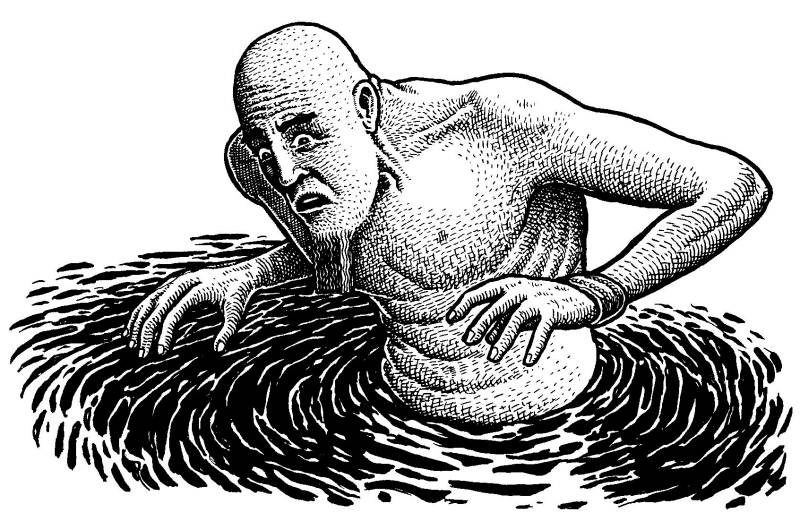
The King stared down at the water; it was turning red!
|
Before it could soak into the soil, it turned blood red! (Ex. 7:22) "There is no miracle your God can perform that my magicians can't perform," Pharaoh said to Moses and Aaron. "Of course you had the advantage. My men could hardly turn the river into blood when it already appeared that way!"
Hoping that Moses and Aaron had been impressed by this comparatively weak display, the king walked away as he struggled to maintain his dignity. (Verse 23)
Seven Days Without Water
The whole nation of Egypt soon was in misery. Water was the life of that arid land. Even the canals, pools and ponds had become blood, which wasn't good even for fertilizer because it was too stenchy to use.
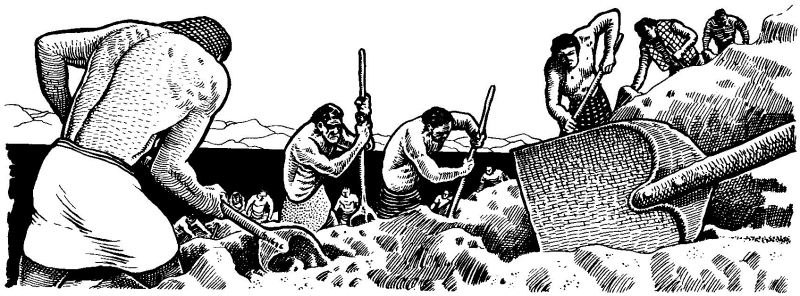
The Egyptians feverishly dug into the river banks in search of springs of clear water.
|
There was a frantic struggle for drinking water for people and livestock. Only in Goshen, where most of the Israelites lived, were there some wells with clear water. Getting it from there or sources outside Egypt was too great a task to serve the whole country. Even many Israelite slaves suffered, though they had the advantage of work stoppages.
Pharaoh and his family were supplied with fresh water at the cost of increased suffering by many servants. What mattered most was the welfare and lives of most of the Egyptians. Realizing that he could lose a nation to rule, Pharaoh decided less than a week later that he would have to contact Moses and Aaron. The discomfort, the shortage of water and the complaining of people were too much for him.
On the eighth day after the Nile had turned to blood, excited servants informed the king that the river and other bodies of water had miraculously returned to normal. There was great rejoicing in Egypt. Pharaoh was relieved that he would be spared asking Moses and Aaron for help, or even to see them. He was quite angry when he learned they had come to see him.
Moses and Aaron Return
Hoping the two Israelites had come to tell him they had given up their desire to take their people into the desert, Pharaoh nodded for his guards to admit the visitors.
"Spare me your old story of asking three days off work for your countrymen!" the king almost shouted as Moses and Aaron walked toward him.
"We have come to warn you that if you refuse to let our people go, God will bring millions of frogs into this country!" Aaron answered. "They will swarm into your kitchens, your beds and wherever you stand, sit or lie!" (Ex. 8:1-4)
"Go tell your God that He can't do more than my magicians can do!" Pharaoh scowled. "I'm not frightened by your tiresome threats!"
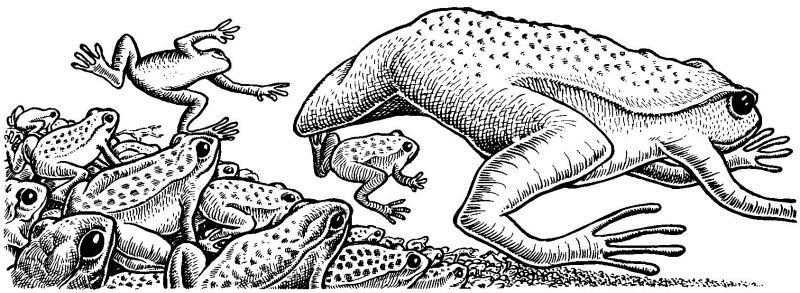
The frogs crawled out of the Nile by the millions, and swiftly spread over the land.
|
The king was worried. He knew his magicians had failed miserably in trying to outperform Israel's God. He would have been much more concerned if he could have foreseen what would happen next morning, when he was awakened very early by the screams of women servants. As he turned over for more sleep, he felt something crawling on his face. He jerked to a sitting position to see in the dim light of early dawn many small frogs hopping and crawling over his bed covers! (Verses 5-6)
|
Angered because his servants would allow such desecration of his quarters, he leaped out of bed to plant his warm feet on a slithery carpet of cold frogs swarming on the floor. He slipped and slid to the door just in time to collide with embarrassed servants struggling to sweep piles of frogs away from his bedroom door.
"Forgive us, sire!" they stuttered. "These creatures are coming from the river in great hordes!"
The king shuddered. He remembered Aaron's prediction, uttered only the day before. He stared almost unbelievingly down on the masses of frogs, alive and dead, that matted the costly carpet of his sleeping chambers.
Pharaoh's Breakfast
Later, when trays of food were brought to the royal dining table, the king resolved he wouldn't let the irksome state of affairs spoil his appetite, and dived into a bowl of food. Suddenly he stopped eating. Tiny green frogs were mixed in with what he had been contentedly chewing! His dining had suddenly ended.
During the next days, the discomfort of the Egyptians increased with the frogs. Again, in a weak attempt to prove that the God of Israel wasn't the only deity who could perform miracles, Pharaoh called on his magicians to display their pagan god-given powers. When they produced frogs, seemingly out of nothing, Pharaoh suddenly decided he had seen enough of such creatures, and that he would be more pleased in seeing them disappear. He called for Moses and Aaron.
"I am weary of gazing at frogs," he admitted to the two Israelites. "If your God will stop them coming out of the river, your countrymen will be free to go to the desert to worship Him!" (Ex. 8:8)
|
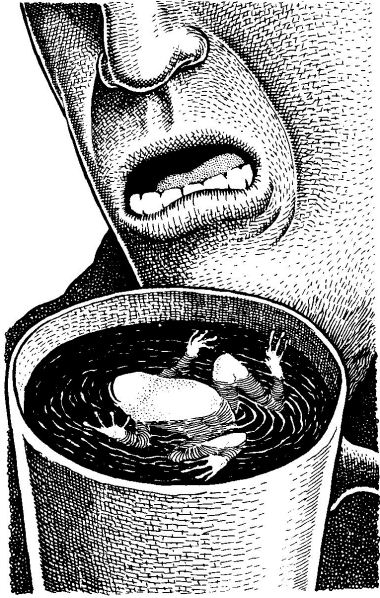
Another frog was floating lifelessly on its back
in a silver cup of Pharaoh's favorite beverage.
|
Elated and thankful, Moses and Aaron promised the invasion of the reptiles would cease next day. Moses at once went to entreat God to stop the plague. Next day the frogs ceased coming out of the river. Then began the massive task of burning or burying the tons of dried and rotted flesh. Days passed. Moses expected the foremen of the Israelite workers would be instructed to tell the laborers the time had come finally to leave, but this didn't happen. Moses and Aaron went to ask the king why he hadn't done as he had said he would.
"I intended to let the workers off," Pharaoh casually and callously explained. "Then I realized that I needed so many of them to help get rid of the dead frogs."
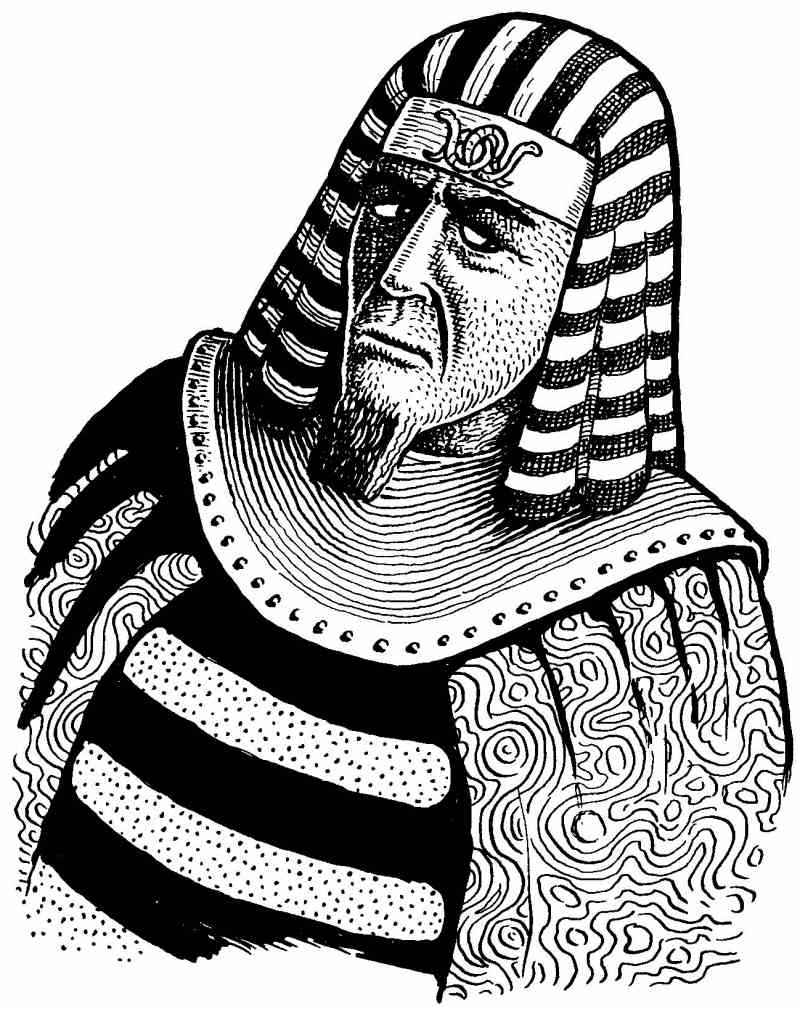
Pharaoh regarded Moses and Aaron with suspicion,
at the same time ignoring his promise to free the Israelites.
|